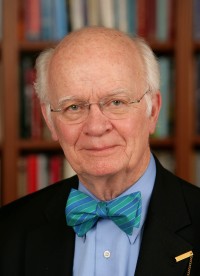Kings and queens
The Larry King show on October 16 featured a discussion of antigay violence in America. Among the guests was evangelist Jerry Falwell, who defended the authority of the whole Bible, including all four inches-worth of texts that might address homosexuality.
Another guest, Andrew Sullivan, openly gay former editor of the New Republic and a Catholic, proposed that no one, including Falwell, is a literalist about all biblical teachings--think of slavery or the patriarchs who did not repent of polygamy. Sullivan also wondered why, if hating the sin of homosexuality is such a central part of Christian ministry, Jesus didn't say anything about it.
Jesus did, said Falwell. How? "Jesus wrote the entire Bible. . . . He, Jesus Christ, the Son of God, and God the Son, inspired all 773,000 words of the English Bible. . . . A little knowledge of the Bible is dangerous. There are 66 books in the Bible, not just four Gospels, and you must take the whole counsel of God."
By stretching Logos Christianity and the cosmic Christology in John 1 and Colossians 1, I suppose one could find a way to argue that Jesus is author of the whole Bible. And if God's providence through Christ extends through the ages down to 1611, when the 773,000 words of the English Bible that Falwell has in mind were inspired and written, one could say that Jesus was on hand to do the writing. But this idea gets one into problems of heresy about the communicatio idiomatum in respect to the hypostases of Jesus Christ. Larry King did not go into that.
I am caught by Falwell's line about Jesus writing the whole English Bible. Jesus in his own time did not know English. But communicatio idiomatum could take care of that, so we won't nail Falwell for heresy. But this suggests that Jesus had to be a participant in the long production of the actual 773,000-word version. And if so, what company did Jesus keep? That which included King James I, as in "the King James Version"?
If you knew King James the way historians know him, you'd have to say that in this case Jesus really had to "hate the sin, but love the sinner." James is described not only by today's fashionable (and to me unattractive) "queer theorists" but also by staid historians who use euphemisms as given to the tendency that Falwell and company are condemning. The historians could not follow James into the bedroom, so they drew conclusions from public lifestyle.
Here's vain James in Josephine Ross's The Monarchy of Britain: "As God's image, [he] cut a poor figure. Bandy-legged and dribbling, with a relish for obscene jokes, he loved to hang on the necks of handsome young men, showering them with caresses and extravagant gifts." But Ira Maurice Price in The Ancestry of Our English Bible says James's "Bible-trained spirit and his theological turn of mind made the whole enterprise congenial to him." Sobersided Geddes MacGregor titles his chapter on the English Bible not "King James" but "'Queen' James," recalling another age's other word for the "wisest fool in Christendom."
Macgregor says that James's association with the English Bible "was not accidental. "Nothing was nearer whatever heart such a man could have"--evidently when the handsome young men's necks were not in range. And what did Jesus say and do about the king's lifestyle? Not one word in the Gospels. The years leading up to 1611 would have been an ideal time for him to have cleared up what troubles so many of us in the churches today. Jesus must have very quietly "hated the sin" and very openly "loved the sinner," but left the rest of us with ambiguities.






